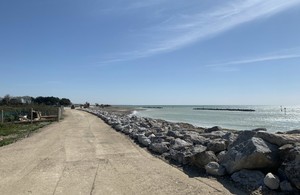Meet the women in engineering helping to shape the world
Although traffic levels may have dropped during the COVID-19 pandemic, for Highways England engineers it’s been an important time for maintenance and work to take place. They’ve been planning, maintaining and building roads to ensure medical and food supplies can be transported around the country to those who need them most.
Highways England is celebrating International Women in Engineering Day (23 June), in a bid to encourage women of all backgrounds to ‘Shape the World’ (this year’s theme) by considering a rewarding career in engineering.
Three of Highways England’s engineers explain more about their roles and how they’ve contributed to the pandemic work force.
Bonnie Pearce, Assistant Project Manager, said:
Working at Highways England has widened my experience and has provided me with knowledge into the lifecycle of a construction project from all areas and specialties needed for the preconstruction period.
I previously worked as a project management professional and engineering surveyor on a variety of environments including large construction sites, residential areas, Network Rail and London Underground gave me a view of construction from a survey perspective, enabling me to move to Highways England into my current role as a project manager on the A303 Stonehenge Project.
The widening of my experience includes working with stakeholders, planning and scheduling works and an insight into contract preparation.
The team I work with on the A303 Stonehenge Project have adapted well to working from home during Covid19 and have kept up communication and supported each other throughout.
Bonnie Pearce, Highways England Assistant Project Manager
Dr Joanna White, Head of Intelligent Transport Systems, said:
Highways England has enabled me to focus on my passion for research in Intelligent Transport Systems and how they can deliver safer and more reliable journeys.
I’ve developed from a Senior Research Engineer through promotion to Team Leader and then to my dream role as Head of Intelligent Transport Systems. I now lead a group of about 25 people who research and develop our technology standards and systems of the future. This includes trialling communications infrastructure to enable connected vehicle environments on our network, helping us to deliver our digital roads ambitions.
I’ve learned about the architecture of the operational technologies we use on our network as well as about emerging technologies, such as connected and autonomous vehicles. I’ve developed as a leader, a people manager as well as improving my understanding of finance and programme management. My career at Highways England has also contributed to building my professional competence and capabilities to become a Chartered Engineer with the Institute for Engineering and Technology which I achieved in March 2020.
Although I’m not a key worker, I’ve participated in regular calls to help manage the changes that have resulted from Covid-19, in particular the move from office-based working to home working and the opportunities and challenges that’s brought. I’ve made sure everyone’s been regularly updated and escalated issues. Part of my group’s remit is to provide advice and assurance to Operations and Major Projects schemes, and by supporting the transition I’ve been able to ensure this service has continued.
Lorraine Bennetts, Senior Project Manager, said:
Highways England has provided a unique opportunity to develop my project management skills in a complex, fast paced and challenging environment. I have been able to make use of a wide variety of training opportunities ranging from formal learning, shadowing senior leadership and more recently access to the Chartered Project Professional cohort approach.
I have developed my knowledge base through formal learning i.e. business case course but perhaps the biggest skill learnt is the art of collaboration. This considers the six iBip behaviours and how together they form collaborative behaviours which empower successful delivery. I endeavour to role model and practice these skills and help others to consider their approach as there is no ‘one size fits all’ and everyone brings a different insight into the working environment. I also have had the opportunity to become a mental health first aider which has been really beneficial in supporting colleagues through difficult times.
First and foremost, in these challenging and unprecedented times, is ensuring that my family and I help stop the spread of the virus by following the rules; maintaining our lock down and social distance requirements whilst balancing this with home-schooling four children and working full time (and living in a static caravan).
In terms of work my project is the A428 Black Cat to Caxton Gibbet Improvements scheme and it has been crucial that we maintain progress on the scheme as we move towards our Development Consent process. This scheme has the potential to unlock economic growth in the area and if we are to recover our economy then maintaining our commitment to the delivery of the RIS is essential.
Lorraine Bennetts, Highways England Senior Project Manager
If you’re interested in finding out more about a career in engineering with Highways England, have a look at our website.
General enquiries
Members of the public should contact the Highways England customer contact centre on 0300 123 5000.
Media enquiries
Journalists should contact the Highways England press office on 0844 693 1448 and use the menu to speak to the most appropriate press officer.


